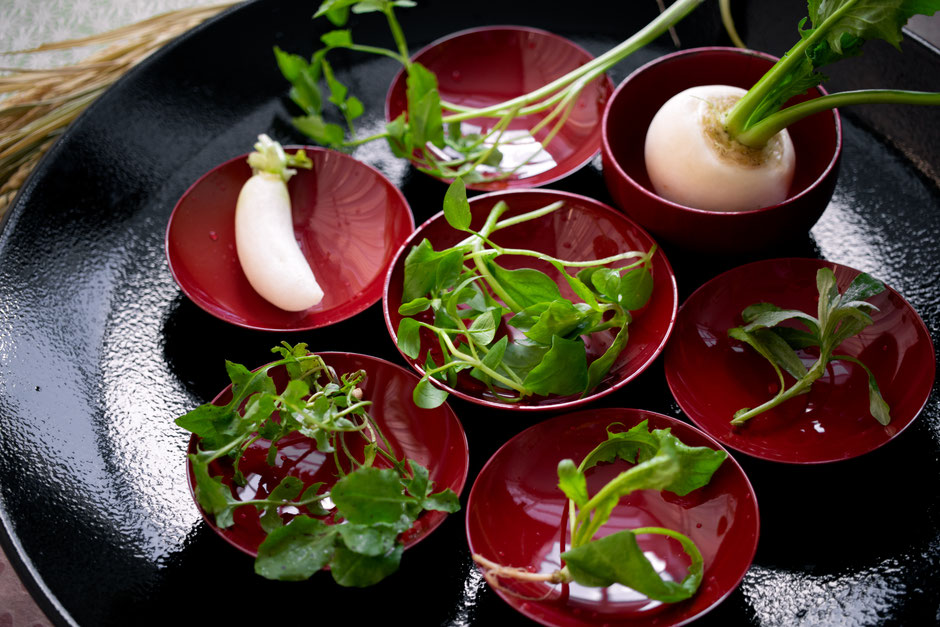
#Ryotei Kinoene in #Kuki City, Saitama Prefecture, Japan.
January 7, today is the day of the seven herbs gruel
Can you name all seven spring herbs?
In this day and age when the seven herbs are sold as a set at supermarkets, few people pick them in the fields or obtain them individually. Nevertheless, it is important to remember the seven wildflowers.
The seven spring wildflowers are the seven young greens: Japanese parsley, rape, gokyogiyo, Hakobera, hotoke-noza, suzuuna, and suzushiro. Actually, there are also the seven autumnal flowers. More on that later.
Understanding the origin of the seven herbs porridge
Nanakusa porridge is made with spring wildflowers. It is said that the custom of "picking wakana (young plants)," which is to pick spring wild plants that have just begun to sprout at the beginning of the year, has existed in Japan since ancient times.
On the other hand, in China, there was a custom of eating seven kinds of young vegetables in a hot soup on "Jinshitsu," which is January 7, to ward off evil spirits. It is believed that this Chinese custom and the ancient Japanese custom of picking young greens were combined, and people began to eat the seven herbs on January 7.
This Jinnichi is actually one of the "five seasonal festivals" along with Joushi-no-Sekku (peach festival) and Tango-no-Sekku (Boys' Festival), and is the first festival to be celebrated after the start of a new year. It is a very moving experience to enjoy the food while thinking about the fact that it is a new year.
It is also said that during the Heian period (794-1185), the custom of the nobles to go out into the field on Hatsune (the first day of the new year for the first child) to pull young pine trees and pick young greens, and the "Wakana wo Kuuzu" ceremony of offering seven or twelve kinds of young greens to the emperor became a court custom of eating the seven herbs, which in turn became the prototype for the custom of the seven herbs.
In ancient times, the seven herbs were prepared in a hot soup called "Atsumono" as in China, but around the Muromachi period (1336-1573), the custom changed to eating them in rice porridge.
The Meaning and Proper Etiquette of Eating the Seven Herbs Porridge
Nanakusa porridge has been passed down through the generations in modern life. Nowadays, the seven herbs begin to appear in the vegetable section of supermarkets as early as the third day of the New Year, but officially, they are eaten on the morning of January 7 to wish for good health and good fortune.
Moreover, it is said that the official way to make this dish is not to make it early in the morning, but to pound and chop the seven herbs one by one every hour (about 2 hours) from the night of the 6th to the morning of the 7th, the day before. Starting at the time of the rooster (around 5:00 p.m. to 7:00 p.m.), one type of herb is chopped at each of the following times: rooster, dog, boar, cub, ox, tiger, and rabbit, and then boiled and eaten at the time of the dragon (around 7:00 a.m. to 9:00 a.m.). I had no idea that they were made overnight!
In some areas, when chopping the seven herbs, people chant such phrases as, "The bird of the Chinese soil will not cross before ......." This is a reference to the "tori-oi" (bird-driving) ceremony during the New Year. This is a custom connected with the "tori-oi" event of the koshogatsu (New Year's Day).
A tradition to soothe tired New Year's stomachs
Regardless of its origin, the stomach is a little tired after a New Year's Eve and New Year's Day holiday filled with a variety of delicacies, and after eating the richly seasoned Osechi dishes. It seems very reasonable to eat the seven herbs porridge at such a time. The fact that the custom of eating rice gruel with the seven herbs still persists in modern times may have a lot to do with the effect of rice gruel with the seven herbs of the season, which is to "rest the stomach and intestines.
(Please consider this as one of the many theories)
For reservations, please call 0480-22-3501
Hours of operation: 10:30 a.m. to 9:00 p.m.
Business hours: Lunch time: 11:30 to 14:00
Evening hours: 2:00 p.m. to 10:00 p.m. (last service at 9:00 p.m.)